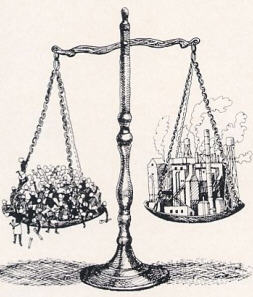Indians in this century, victimized by the propaganda that urban industrial development will bring them well-being and prosperity, have neglected the Vedic principles of God consciousness. The British established factories and introduced materialism, and Jawaharlal Nehru, the first prime minister of independent India, simply followed this policy, although his spiritually inclined mentor, Mahatma Gandhi, was opposed to it.

After independence, in the 1950s, thousands of poor Indians found employment in the nation's developing steel mills. But were they any happier or more advanced for having abandoned their God-conscious agricultural life in the villages? The cities became one of the most heavily industrialized areas in the world, and living conditions worsened.
Soviet propaganda would have us believe that industrialization is making India prosperous. According to Pravda (11/10/84), "India, a country that until recently knew only the wooden plow, is now among the world's top ten industrial producers. . . . India's pride the state steel mills at Bhilai, Bokaro, Durgapur, and Raurkela substantially increased their output [in 1984] and made it possible to reduce steel imports by one million tons. These and other economic successes of India are directly linked to cooperation with Socialist countries."
Economic success, however, means that people have enough food and other basic necessities. India's poor factory workers can't eat nuts and bolts produced in the factories. They, and all of us, must rely on what is produced in the fields by the mercy of the Supreme Lord. So to measure prosperity in terms of industrial production is foolish.
In fact, industrialization thrives at the cost of human lives, a matter the Indian government has apparently chosen to ignore. Said U.S. News & World Report(1/14/85), a "sign of improved [U. S.-Indian] relations has been the official reaction to the Union Carbide chemical spill at Bhopal that killed at least 2,000. The government. which wants more foreign investment, has discouraged criticism of the U.S. for the accident at the American-owned plant."
Thirty years ago, concerned that India's leaders were rejecting their country's spiritual heritage for Western standards, Srila Prabhupada, the founder of BACK TO GODHEAD magazine, was writing articles calling for a return to India's spiritual culture. Moreover, that culture must not only be revived, he said, but it must be distributed throughout the world. Telephones, automobiles, and radios, he would argue, are not emblems of prosperity. Real prosperity lies in spiritual understanding, real poverty in ignorance. Since all suffering is ultimately caused by ignorance, poverty and misery can be eliminated not by industrializing but by cultivating spiritual knowledge. Srila Prabhupada's articles would argue that even if people have all the facilities and amenities of modern material advancement, their unhappiness and unrest would continue until they attained spiritual satisfaction. He would remind his readers that the West had seen only materialism and had therefore never known peace. If India followed the West, the only results would be strife and war a harsh prediction that time has borne out.
The most significant strife recently has been the unrest of the Sikhs who are demanding total political independence from India. This schismatic movement had a part in the assassination of Indira Gandhi (Nehru's daughter), after which India experienced a week of fratricidal conflict. Such internal danger arises out of the prevalent lack of spiritual understanding. Historically, India's castes and religious groups have lived together peacefully. But as Indians reject the Vedic culture, ignorance and unrest have naturally ensued. Thus the real danger in India is not economic stagnation. Whenever India has had problems with minorities, it has not been just because there was an economic problem.
It is to be hoped that by the start of the next century, India's drift away from things spiritual and her unswerving dedication to economic development will have been altered under Rajiv Gandhi's leadership. If this course isn't followed, it looks like India will be out to lead the world in the mad race for materialism.
